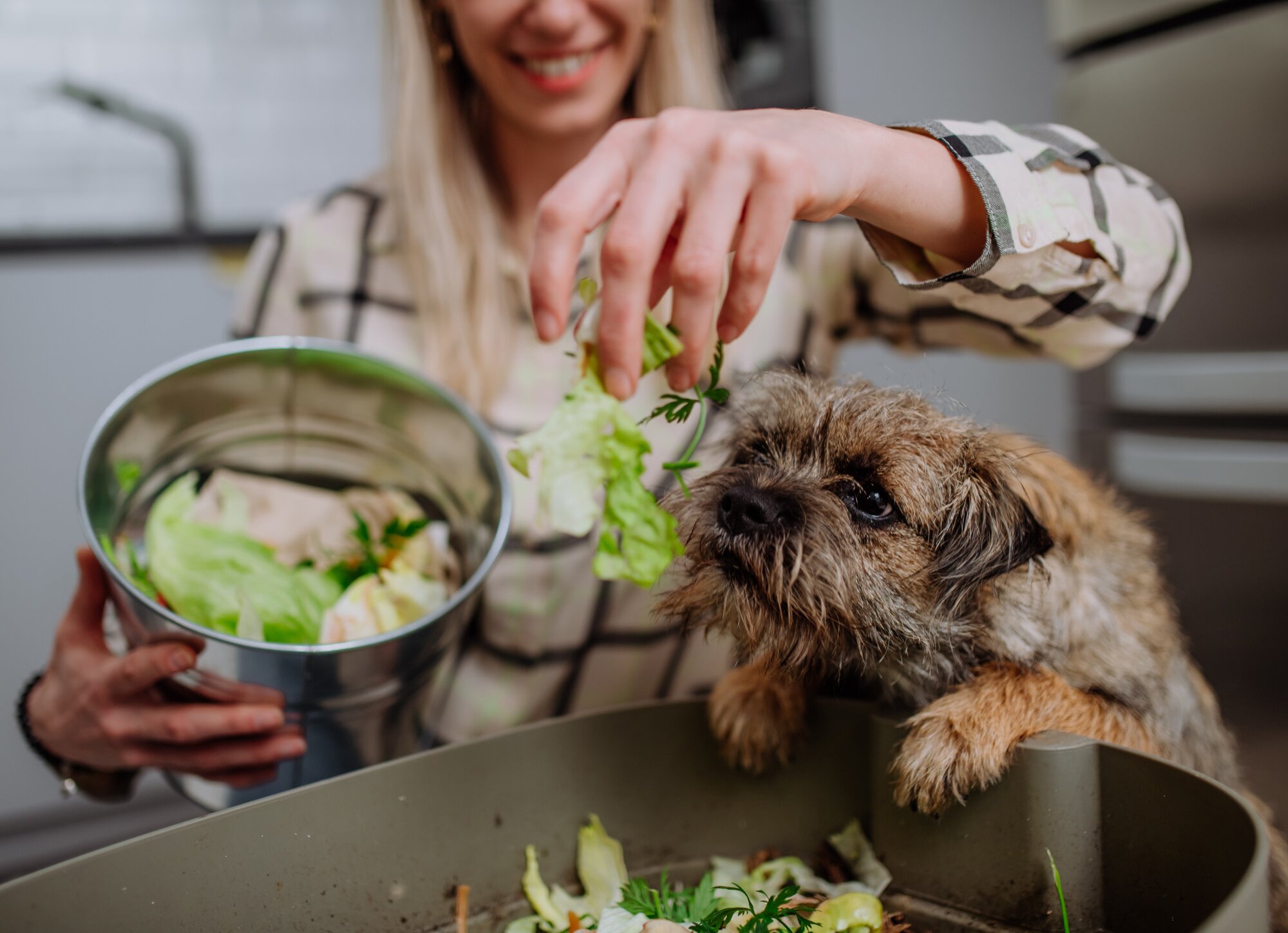Dogs are typically food-motivated pets when it comes to training and general obedience. Introducing new foods to your dog's diet can help keep training sessions interesting. And, some human foods can have health benefits for dogs.
If you've ever wondered "what veggies can dogs eat," keep reading to learn which vegetables dogs can eat safely, and which ones to avoid.
Why vegetables are good for dogs
Fresh vegetables contain vitamins and minerals that may boost a dog's immune system. Veggies like sweet potatoes and green beans have health benefits that aid in digestive health, healthy skin, and hydration.
Pet parents looking to feed vegetables to their dog should remember, that dogs need a balanced diet to stay healthy. Plus, not all dogs enjoy eating vegetables. Be sure your dog is getting all the nutrients they need in their pet food and supplements.
18 vegetables that are safe for dogs
Dogs can eat cooked vegetables or raw vegetables. If eaten raw, be sure to cut the veggies into small pieces so they are easier to digest.
Here are 18 vegetables that dogs can eat safely.
1. Asparagus

Asparagus is rich in vitamins and minerals like copper, potassium, chromium, and selenium. These raw vegetables are a good alternative to chewing sticks. Or, you can cook veggies like asparagus to make them easier to swallow.
2. Beans

Black, pinto, red kidney, and butter beans are safe for dogs to eat. Cooked beans are a good source of plant protein, magnesium, potassium, and folate.
3. Beets

Beets have vitamin C, folate, manganese, potassium, and fiber and promote a healthy skin and coat. Cooked beets are safe for most dogs. But, avoid them if your dog is prone to bladder stones and UTIs.
Raw beets can be a choking hazard and can cause obstructions in the digestive tract. And, beets are naturally acidic, which can cause nausea, diarrhea, and vomiting. Only add a small amount of cooked beets to your dog's diet and stop feeding them if your dog has a negative reaction.
4. Bell peppers

Bell peppers contain beta-carotene and lots of vitamin C. They boost immune system strength, eye health, and are anti-inflammatory.
5. Broccoli

Broccoli, when chopped into small pieces, is a good source of fiber and vitamin C. However, broccoli florets contain isothiocyanate, which can harm your dog's stomach when eaten in large amounts.
6. Brussels sprouts

Cooked Brussels sprouts contain vitamins C and K, making them great for building healthy bones and boosting immunity. They also help with digestive tract health and reduce inflammation.
7. Cabbage

Cabbage has phytonutrients and important vitamins and minerals that build a healthy immune system in dogs. But, too much cabbage may cause stomach pain and gas.
8. Carrots

Raw carrots are great for digestive health and are low-calorie. Rich in vitamins C and K, carrots are one of the best vegetables for dogs when it comes to bad breath and overall dental health.
9. Cauliflower

Cooked cauliflower is great for strengthening your dog's immune system. It contains omega-3 fatty acids, biotin, manganese, phosphorus, and vitamins C and K. Cauliflower is only safe in small amounts, as it can cause gastric upset.
10. Celery

Celery is a great snack, rich in vitamins A, B, C, and K. It also contains potassium and manganese. Celery is low-calorie and it is a natural breath freshener for dogs.
11. Corn

Dog parents can feed their dog corn safely. But, corn doesn't really have any nutritional value.
Only offer corn in small quantities, and never feed your dog corn on the cob. The cob can cause an intestinal blockage if swallowed.
12. Green beans

Green beans are healthy treats for dogs and are full of nutrients. Plain green beans — canned, raw, or steamed — are safe for your canine companion.
13. Kale

Kale is a leafy green superfood with lots of health benefits. Kale is great for eye health, boosting your dog's immune system, and building your dog's red blood cells.
Kale contains calcium oxalate and isothiocyanates, which can cause upset stomach and gastric irritation. So, only feed your dog kale in small amounts.
14. Peas

Fresh or frozen peas are good for dogs and contain vitamins A, B, and K. Peas also have iron, magnesium, potassium, and zinc. Pet parents should avoid canned peas and only feed their dog these raw veggies in moderation.
15. Potatoes

Cooked potatoes served plain are safe for your dog. Raw potatoes contain solanine, which is toxic to dogs. Avoid adding salt or butter to potatoes you feed your pet.
16. Spinach

Spinach is a great source of iron, magnesium, and vitamins A, C, and E. Spinach also helps to:
- Reduce inflammation
- Prevent cardiovascular disease
- Boost heart health
- Prevent cancer
But, spinach contains oxalic acid. Oxalic acid can damage your dog's kidneys when consumed in large amounts. So, it's best to feed your dog spinach in small amounts.
17. Sweet potatoes

Plain sweet potatoes are safe for dogs as an occasional treat. Sweet potatoes are a good source of fiber, healthy antioxidants, and vitamins and minerals.
18. Zucchini

Zucchini is safe to eat in moderation, as it is low-calorie and high in fiber. Zucchini also contains vitamins C, A, and K. Zucchini can be beneficial for dogs needing to lose weight.
What vegetables can dogs not eat
While some veggies are a safe, tasty treat for dogs, not all veggies are safe. When your dog eats a vegetable toxic to dogs, it may make their stomach upset.
Eggplant
While eggplant isn't technically toxic to dogs, some dogs may be allergic to eggplant. And, dogs with kidney issues or arthritis should avoid it. If you see your dog eat eggplant, monitor for symptoms like nausea and diarrhea.
Garlic
Garlic can damage your dog's blood cells and upset their stomach. Garlic is part of the allium species of plants, which is toxic to dogs.
Onions
Onions contain N-propyl disulfide, which causes the red blood cells in your dog's body to break down. When consumed in large amounts, onions may cause anemia.
Wild mushrooms
Wild mushrooms and regular mushrooms can be tricky to distinguish. Avoid giving your vegetarian dog mushrooms of any kind, but especially those that grow in forested or damp areas.
VET TIP
Call the pet poison hotline if your dog consumes vegetables dogs can't eat. Monitor your dog for symptoms like nausea, diarrhea, vomiting, and lethargy.
3 ways to add vegetables to your dog's diet

There are many ways to prepare vegetables to treat your dog. Here are three ways to give dog-safe vegetables to your pet as an occasional treat.
1. Add vegetables to their dog food.
If you want to spice up your dog's regular food at mealtime, try sprinkling some vegetables dogs can eat in their food.
Many commercial dog foods lack essential vitamins and minerals. Adding bite-size pieces of vegetables as a topper on dog food can help keep your pet healthy.
2. Use them as a healthy snack.
Aside from mealtime, chopped vegetables are a great snack for dogs. Try steaming vegetables for dogs, then cutting them into small pieces for your dog to eat.
3. Create an enrichment toy.
Safe vegetables for dogs are a practical treat. But, did you know you can make enrichment toys with vegetables? Enrichment toys aid in keeping your pet's nervous system healthy.
Enrichment also helps keep your dog calm and happy. It also helps keep your dog motivated while trick training.
Boil carrots in bone broth and then freeze them for a fun, summer enrichment activity. Or, steam and mash peas onto a lick mat for a long-lasting, tasty treat.
While lots of vegetables are okay for dogs to enjoy, it's essential to understand which ones are good for them and which can be risky. Adding vegetables to dog food or using them as treats can help your dog achieve a balanced diet.


